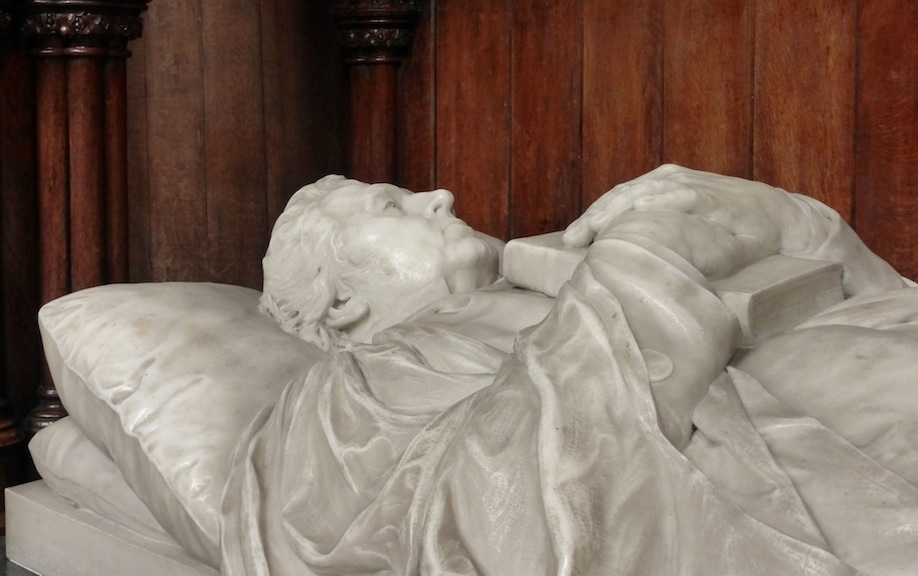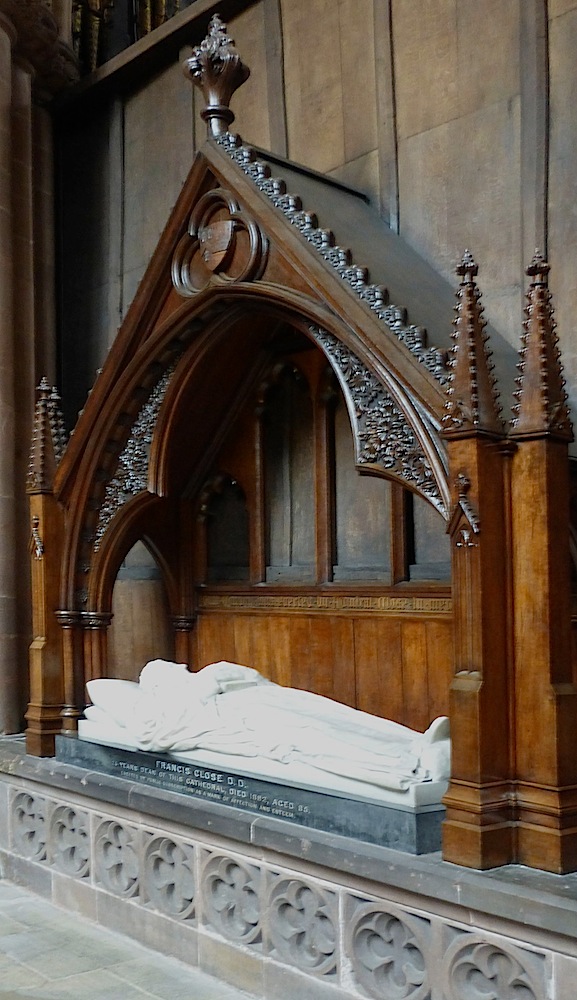
Monument to Bishop Francis Close (1797-1882), by Henry Hugh Armstead (1828-1905). 1885. Marble effigy in a carved Gothic wooden canopy. The monument is inscribed, "Francis Close, D.D., 25 years Dean of this cathedral, died 1882, aged 85. Erected by public subscription as a mark of affection and esteem." The canopy was given by his son, Admiral Close (see Eley 69). The monument is in Carlisle Cathedral.


Left: Bishop Close, detail. Right: Whole monument, showing Gothic wooden canopy.
As perpetual curate of Cheltenham parish church, Bishop Close had "developed the spa town into a leading evangelical centre" (Munden). He is still very much remembered for his educational initiatives there, particularly for establishing the Cheltenham Training College in 1847. This was the beginning of what is now the University of Gloucestershire: the foundation stone of its Francis Close Hall campus was laid in 1849 (see "University of Gloucestershire"). A tall man with a commanding presence, the Rev. Close was evidently a forceful figure there. Joseph Leech, "one who has no disposition to be either the enemy or adulator of tbe Vicar of Cheltenham," describes him as he was at that time:
The Rev. Francis Close is certainly no common place man. The supremacy he has asserted and acquired over his parishioners is in itself a proof of his ability; for he must know man, and woman, very well — he must have a considerable natural turn for command — to obtain the social empire of the place as he has done: for, mark you, there must be a forward intrepidity about his nature to enable him to "hold his own," or rather more than his own, so far as clerical influence goes, and in such a large place, so long.... though, perhaps, he has not always the best of the argument, he has the tact and talent of getting the best of the audience. He is a man of Herculean power in doing work — of indomitable energy, as you must perceive — you only note the number of things of one kind or another which he gets through in the day: he is at the top and bottom of everything; and the habit of command and dictation, and driving all before him, which he has fallen into, and of which some people complain, is, I think, created” by themselves, and their own notion that nothing can be done without him.... He is a sort of surpliced autocrat in the place.... [258-59]

Francis Close,” by John Richardson Jackson, after Henry Wyndham Phillips, mezzotint, published 1850. © National Portrait Gallery, London, NPG D33534.
In Carlisle, Bishop Close would be remembered not only for his education projects, his energy and leadership, but for his charitable work ("The poor people of Carlisle lost a good friend when he passed away") and his strictness with himself and others: "Although a very popular preacher his theological views were far from broad. He was, also, a strenuous opponent of betting, theatre-going, indulgence in alcoholic liquors, and smoking" (Eley 69). A Sabbatarian, he even opposed Sunday trains (see Munden). Armstead has given him comfortable-looking pillows and an elegantly draped cassock, but without any frippery of angels. In matters of doctrine, Evangelicals lent entirely on the authority of the bible, and the bishop holds his bible earnestly to his breast.
Photographs, text and formatting by Jacqueline Banerjee. [You may use the first three images without prior permission for any scholarly or educational purpose as long as you (1) credit the photographer or source and (2) link your document to this URL in a web document or cite the Victorian Web in a print one. Click on the images for larger pictures.]
Related Material
Bibliography
Eley, C. King. Bell's Cathedrals: The Cathedral Church of Carlisle: A Description of Its Fabric and A Brief History of the Espicopal See. London: George Bell & Son, 1900. Internet Archive. Uploaded from Robarts Library, University of Toronto. Web. 18 July 2014.
Leech, Joseph. The Church-goer. Rural rides; or, Calls at country churches. Bristol: John Ridler / London: Hamilton, Adams, & Co., 1847. Internet Archive. Uploaded” by Oxford University. Web. 18 July 2014.
Munden, A. F. "Close, Francis (1797-1882)." Oxford Dictionary of National Biography. Online ed. Web. 18 July 2014.
"The University of Gloucestershire: Our Anglican Heritage." Web. 18 July 2014.
Content last modified 1 May
2013; reformatted 16 March 2015